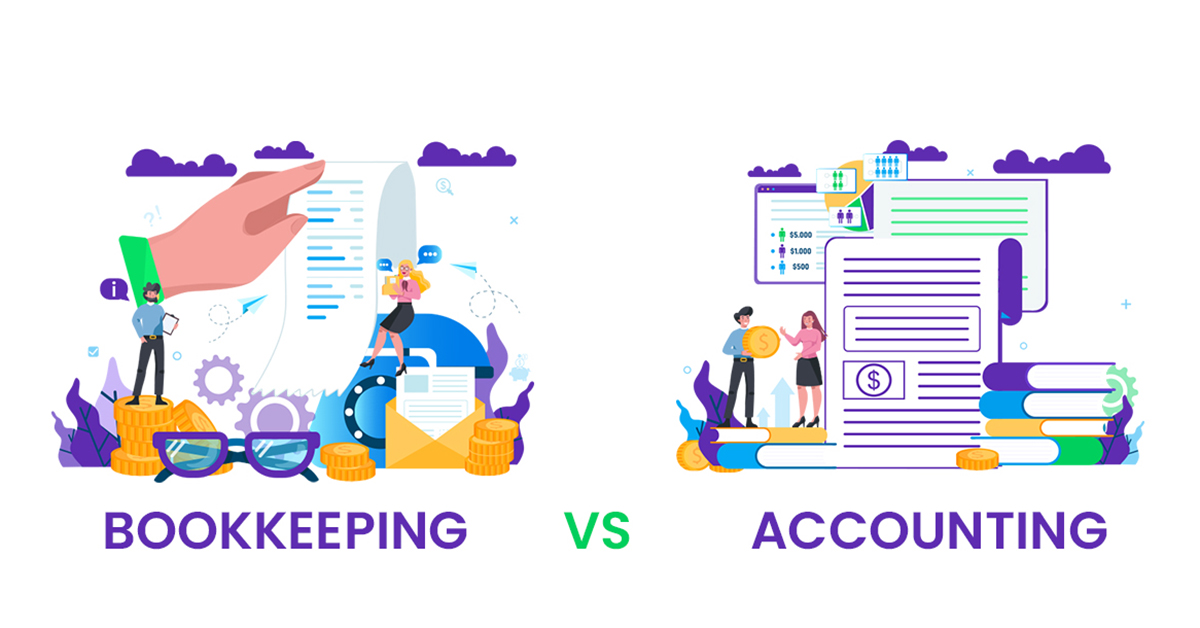Unraveling the Difference Between Bookkeeping and Accounting

Bookkeeping and accounting are two closely related yet distinct financial disciplines. Oftentimes, these terms are used interchangeably, leading to confusion. However, understanding their differences is crucial for businesses and individuals alike. Now let’s discuss the difference between accounting and bookkeeping.
Bookkeeping: The Foundation of Financial Record-Keeping
Bookkeeping is the process of methodically recording financial transactions. Specifically, bookkeepers maintain comprehensive records of all money flowing in and out. They record transactions such as sales, purchases, payments, and receipts.
The primary responsibilities of a bookkeeper include:
- Recording transactions in the appropriate ledger accounts (e.g., cash, accounts receivable).
- Posting debits and credits to the general ledger.
- Reconciling bank statements and ensuring accuracy.
- Monitoring accounts payable and receivable.
- Generating financial statements and reports.
In essence, bookkeepers act as the gatekeepers of financial data entry. They ensure that all transactions are accurately documented and categorized. Consequently, this lays the groundwork for accounting processes.
Accounting: The Interpretation and Analysis of Financial Data
Accounting is a broader discipline that encompasses bookkeeping and much more. While bookkeepers record transactions, accountants analyze and interpret that financial data. Their role is to provide insights and guidance based on the information.
The key functions of accountants include:
- Preparing and analyzing financial statements (balance sheets, income statements, cash flow).
- Advising on tax planning and compliance.
- Conducting audits to ensure accuracy and compliance.
- Providing financial forecasting and budgeting services.
- Offering strategic advice on financial decisions.
Accountants leverage their expertise to derive meaningful conclusions from financial records. They use this information to guide businesses and individuals on financial matters. Additionally, accountants ensure compliance with relevant laws, regulations, and accounting standards.
The Differences Between Bookkeeping and Accounting
While bookkeeping and accounting are interconnected, several key distinctions set them apart:
- Scope: Bookkeeping is a component of the accounting process. Conversely, accounting encompasses bookkeeping as well as other crucial financial functions.
- Focus: Bookkeepers record financial transactions, while accountants analyze and interpret that data.
- Qualifications: Bookkeepers typically receive on-the-job training or vocational education. In contrast, accountants require formal education and professional certification.
- Responsibilities: Bookkeepers maintain records, while accountants provide insights, guidance, and strategic advice.
- Financial Statements: Bookkeepers generate basic financial statements, whereas accountants analyze and interpret complex financial reports.
- Tax Compliance: Bookkeepers may assist with tax preparation, but accountants provide tax planning and compliance services.
- Decision-Making: Bookkeepers provide data, while accountants use that data to inform business decisions.
The Complementary Nature of Bookkeeping and Accounting
Despite their differences, bookkeeping and accounting are interdependent and complementary. Accurate bookkeeping is essential for accountants to perform their analyses effectively. Conversely, accountants provide oversight and ensure bookkeeping practices align with standards.
In small businesses, one person may handle both roles initially. However, as a company grows, separating bookkeeping and accounting responsibilities becomes advisable. This separation ensures checks and balances while allowing each discipline to focus on its strengths.
The Integration of Technology
Technology has revolutionized both bookkeeping and accounting practices. Numerous software solutions now automate many tasks previously done manually. For instance, cloud-based accounting software can automatically categorize transactions and generate reports.
Nevertheless, human expertise remains invaluable for interpreting and analyzing financial data accurately. While technology streamlines processes, bookkeepers and accountants still play crucial roles. Their knowledge and judgment are essential for making informed decisions.
Choosing the Right Professional
Determining whether to hire a bookkeeper, accountant, or both depends on needs. Small businesses or individuals with simple financial situations may suffice with bookkeeping services. However, as financial complexities increase, the expertise of an accountant becomes indispensable.
When selecting professionals, consider factors such as qualifications, experience, and specializations. Bookkeepers with industry-specific knowledge can ensure compliance with relevant regulations. Similarly, accountants specializing in areas like tax or auditing can provide tailored guidance.
The Importance of Accurate Financial Records
Regardless of the specific roles, maintaining accurate and up-to-date financial records is paramount. Poorly kept records can lead to costly errors, fines, and missed opportunities. Conversely, well-maintained records enable informed decision-making and strategic planning.
By understanding the differences between bookkeeping and accounting, businesses can allocate resources effectively. Investing in both disciplines ensures financial processes are streamlined, compliant, and optimized for success.
In conclusion, while bookkeeping and accounting are related, they serve distinct purposes. Bookkeeping lays the foundation by meticulously recording transactions. Accounting, on the other hand, involves analyzing and interpreting that financial data. By recognizing their differences and leveraging their complementary nature, businesses can make informed decisions and achieve long-term financial success.









